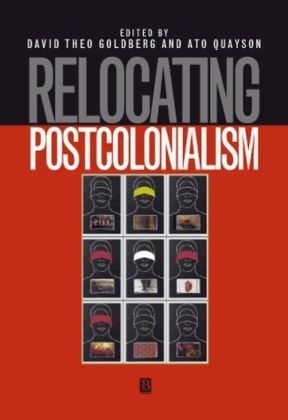Read more
Informationen zum Autor David Theo Goldberg is Professor of African American Studies and Criminology! Law! and Society at the University of California! Irvine and Director of the system--wide University of California Humanities Research Institute. His books include The Racial State (2002)! Race Critical Theories: Text and Context (2002! co--edited with Philomena Essed)! and Racist Culture: Philosophy and the Politics of Meaning (1993). Ato Quayson is Lecturer in the English Faculty! Director of the African Studies Centre! and Fellow of Pembroke College at the University of Cambridge. He is the author of Strategic Transformations in Nigerian Writing (1997)! Postcolonialism: Theory! Practice or Process (2000)! and Calibrations: Reading for the Social (2002). Klappentext Relocating Postcolonialism brings together the essays of well-established contributors to postcolonialism as well as emergent scholars. The conversational quality of the volume, enhanced by the relay of themes explored by different essayists, provides a compelling portrait of postcolonialism's development that will be valuable to scholars, students, and teachers. The collectionincludes an incisive conversation between John Comaroff and Homi Bhabha, as well as a new essay by Gayatri Chakravorty Spivak. Probing well-known ideas as well as unexplored areas of concern, Relocating Postcolonialism locates the current state of postcolonial studies by examining its central lines of inquiry. Zusammenfassung * Brings together well--established contributors and emergent scholars in postcolonialism. * Presents essays in dialogue with each other to create a controversial collection that examines the current state of postcolonial studies. Inhaltsverzeichnis Preface. Introduction: Scale and Sensibility. (Ato Quayson and David Theo Goldberg). 1. In Conversation with Neeladri Bhattacharya! Suvir Kaul and Ania Loomba. (Edward Said). 2. Speaking of Postcoloniality! in the Continuous Present: A Conversation. (Homi Bhabha and John Comaroff). 3. Resident Alien? (Gayatri Chakravorty Spivak). 4. Directions and Dead--ends in Postcolonial Studies. (Benita Parry). 5. Racial Rule. (David Theo Goldberg). 6. Racist Visions for the Twenty--first Century: On the Cultural Politics of the French Radical Right. (Ann Stoler). 7. Breaking the Silence and a Break with the Past: African Oral Histories and the Transformations of the Atlantic Slave Trade in Southern Ghana. (Anne Bailey). 8. Forgotten Like a Bad Dream: Atlantic Slavery and the Ethics of Postcolonial Memory. (Barnor Hesse). 9. Connectivity! and the Fate of the Unconnected. (Olu Oguibe). 10. Towards (Re)Conciliation: The Post--Colonial Economy of Giving. (Pal Ahluwalia). 11. The Economy of Ideas: Colonial Gift and Postcolonial Product. (Zane Ma--Rhea). 12. Looking Awry: Tropes of Disability in Postcolonial Writing. (Ato Quayson). 13. Theorizing Disability. (Rosemarie Garland Thomson). 14. Nature! History and the Failure of Language: The Problem of the Human in Postapartheid South Africa. (John Noyes). 15. Passing as Korean--American. (Wendy Ann Lee). 16. Myths of East and West: Intellectual Property Law in Postcolonial Hong Kong. (Eve Darian--Smith). 17. A Flexible Foundation: Constructing A Postcolonial Dialogue. (Dawn Duncan). 18. Linguists and Postcolonial Literature: Englishes in the Classroom. (Laura Wright and Jonathan Hope). 19. Post--Scriptum (Francois Verges). Index. ...
List of contents
Preface.
Introduction: Scale and Sensibility. (Ato Quayson and David Theo Goldberg).
1. In Conversation with Neeladri Bhattacharya, Suvir Kaul and Ania Loomba. (Edward Said).
2. Speaking of Postcoloniality, in the Continuous Present: A Conversation. (Homi Bhabha and John Comaroff).
3. Resident Alien? (Gayatri Chakravorty Spivak).
4. Directions and Dead-ends in Postcolonial Studies. (Benita Parry).
5. Racial Rule. (David Theo Goldberg).
6. Racist Visions for the Twenty-first Century: On the Cultural Politics of the French Radical Right. (Ann Stoler).
7. Breaking the Silence and a Break with the Past: African Oral Histories and the Transformations of the Atlantic Slave Trade in Southern Ghana. (Anne Bailey).
8. Forgotten Like a Bad Dream: Atlantic Slavery and the Ethics of Postcolonial Memory. (Barnor Hesse).
9. Connectivity, and the Fate of the Unconnected. (Olu Oguibe).
10. Towards (Re)Conciliation: The Post-Colonial Economy of Giving. (Pal Ahluwalia).
11. The Economy of Ideas: Colonial Gift and Postcolonial Product. (Zane Ma-Rhea).
12. Looking Awry: Tropes of Disability in Postcolonial Writing. (Ato Quayson).
13. Theorizing Disability. (Rosemarie Garland Thomson).
14. Nature, History and the Failure of Language: The Problem of the Human in Postapartheid South Africa. (John Noyes).
15. Passing as Korean-American. (Wendy Ann Lee).
16. Myths of East and West: Intellectual Property Law in Postcolonial Hong Kong. (Eve Darian-Smith).
17. A Flexible Foundation: Constructing A Postcolonial Dialogue. (Dawn Duncan).
18. Linguists and Postcolonial Literature: Englishes in the Classroom. (Laura Wright and Jonathan Hope).
19. Post-Scriptum (Francois Verges).
Index.
Report
"Taken together, the diverse contributions to this book represent a sustained attempt to bring postcolonial criticism into a dialogue with some of the most pressing and enduring issues of our times. I cannot think of any other book that helps us to see so clearly where postcolonial criticism is headed." Dipesh Chakrabarty, University of Chicago
"This volume is a fine demonstration of the inexhaustible connectivity of postcolonialism-as-critical-thinking - not only across academic disciplines and sociopolitical formations but also across generations of scholars with divergent intellectual practices. For anyone concerned with this major field of knowledge, it will prove a stimulating and rewarding read." Rey Chow, Brown University
"This much needed collection indicates the continuing significance of postcolonial discourse today and its complex relationship to fields such as critical race theory, ethnic studies, and disability studies. The wide-ranging discussions will make this volume particularly useful to scholars committed to cross-cultural exchanges." Sangeeta Ray, University of Maryland

